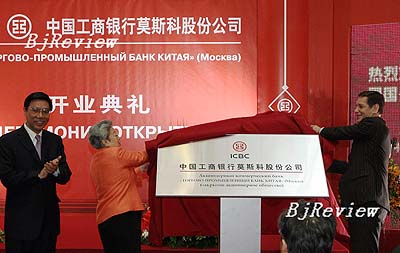|

The Industrial and Commercial Bank of China (ICBC), the world's biggest lender by market value, will acquire a 20-percent stake in South Africa's Standard Bank for $5.5 billion, said ICBC President Yang Kaisheng, at the 4th Annual Conference of International Finance Forum just concluded on November 8.
If the acquisition is closed smoothly, it will be a milestone for China's commercial banks that are striving to deliver a better performance on the global financial stage. Differing from the small Bank Halim of Indonesia and Seng Heng Bank of Macao which the Chinese bank purchased several months ago, Standard Bank of South Africa is truly a major international bank. Standard Bank has a presence in 18 African countries and 19 major financial centers in Europe, North America and Asia, and is focusing its expansion in burgeoning markets. It topped all other African banks in terms of assets and profits and ranked 106th in the Top 1,000 World Banks by The Banker magazine last year.
Besides this recent news, China Minsheng Bank Corp. also announced on October 8 that it would pay up to 2.5 billion yuan ($333.3 million) for a 9.9-percent stake in UCBH Holding Inc., the Nasdaq-listed parent company of U.S.-based United Commercial Bank. This was the first overseas acquisition of the Beijing-based mid-sized lender as well as the first ever acquisition of a U.S. bank by a Chinese bank. On November 8, China Merchants Bank got the green light from the U.S. Federal Reserve for opening a branch in New York-the first nod given by the financial security watchdog to a Chinese bank for branch operations in U.S. territory after it implemented the Foreign Bank Supervision Enhancement Act of 1991(FBSEA).
In recent years, more Chinese banks including the Bank of China (BOC), China Construction Bank (CCB) and China Development Bank (CDB) have concluded overseas acquisitions deals.
"The domestic market will remain the major source of profits for Chinese banks for quite a long period of time," said Guo Tianyong, Director of the Research Center of the Chinese Banking Industry under the Central University of Finance and Economics. "But confronted with foreign banks keen on securing larger stakes in the Chinese market, Chinese banks have to get stronger through investing overseas, and it's undoubtedly an effective way to lower risks."
Bigger and stronger
The two-way opening up of China's financial industry-allowing foreign banks to invest in the Chinese market and encouraging domestic banks to seek shares of overseas markets--is a trend of globalization, said Peng Xingyun, a researcher with the Financial Research Center under the Chinese Academy of Social Sciences.
Nobody would have taken Peng's opinion seriously if he had expressed it several years ago when almost all China's commercial banks suffered from non-performing loans (NPLs) accumulated before the 1990s, and extremely low capital adequacy rates which failed to offset any risk.
"Huge changes have taken place in China's banking industry in recent years," said Peng. China's banking sector has taken on a new look due to the fact that all major state-owned commercial banks have taken pains to rid themselves of historical burdens, lowering the rate of NPLs and preparing for IPOs through shareholding reform over the past several years. For example, CCB, BOC, ICBC and some regional shareholding banks have been listed on the stock market and attracted overseas strategic investors in succession after 2003. By September 30, 2007, ICBC, CCB and BOC ranked, respectively, the world's first, fifth and sixth largest listed banks by market value.
It has been a must choice for Chinese enterprises eager to overcome their development bottleneck to invest overseas in order to obtain resources, energies, brand influence and sales channels, and the banking sector is no exception.
"It's the right time for Chinese banks to launch overseas expansion," said Luo Zhiheng, General Manager of BOCI Research Ltd. "The great pressure of renminbi appreciation and excess domestic liquidity needs to be eased by investing overseas, and besides, it will be a good bargain for Chinese banks to purchase international financial assets against the backdrop of China's bullish stock markets and excess foreign exchange reserves."
By the end of the third quarter this year, China's foreign exchange reserves had swelled to $1.43 trillion, remaining the world's largest. China still faces severe liquidity. The net injection of money was 195.8 billion yuan ($26.1 billion) for the first three quarters of this year, a year-on-year increase of 30.2 billion yuan ($4.0 billion). As a solution, the government has founded the China Investment Corp. to soak up excess liquidity and at the same time moderately released liquidity and increased qualified domestic institutional investor (QDII) quotas to encourage the outflow of capital from China.
"Against this backdrop, Chinese banks could avoid risks in the exchange rate market and help to ease the pressure on the government from its huge forex reserves through overseas assets acquisition," said Guo.
Cai Esheng, Vice Chairman of the China Banking Regulatory Commission (CBRC), made it explicit that the CBRC would actively encourage and support Chinese financial institutions to seek overseas expansion.
Stepping stones to success
"Cross-border mergers and acquisitions have been a major method for a majority of Chinese banks to tackle overseas markets in recent years," said Yang. "The world's top 10 banks by market value last year all got bigger through merger and acquisition activities."
According to Xia Bin, Director of the Institute of Finance Research under the Development Research Center of the State Council, overseas acquisition is the most convenient way for banks to implement global expansion strategies as it helps to augment their capital size. "The size of a bank changes in direct proportion to customer trust as well as the bank's market share," said Xia. "An impressive size endows a bank with a competitive edge, and acquisition also helps a bank to save resources, optimize resource allocation, increase its market shares, lower its operational costs and augment its profits. "
| 